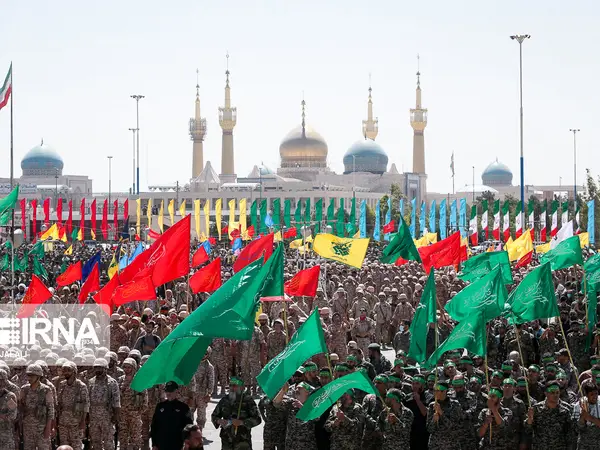The Basij militia of the Revolutionary Guards (IRGC) began extensive urban exercises in various areas of the restive southwestern Khuzestan Province Thursday.
An IRGC official in Khuzestan, Colonel Mohammadreza Leilizadeh, said Thursday evening that 65 battalions of male and 28 battalions of female members of the Basij will be participating in the exercises.
A large gathering was also held at the Imam Khomeini tomb complex in Tehran by the IRGC's Sarallah force in Tehran, which is tasked to deal with protests and defend centers of government power in the capital.
Basij is one of the IRGC’s five forces, which partly consists of volunteers who receive military training under IRGC command. Armed Basij militia are often deployed to suppress protesters and have been accused of brutalizing protesters. In the past two weeks protesters have attacked at least two Basij headquarters in three small towns -- Hafshajan, Jouneghan, and Baba Heydar – in in Chahar Mahal and Bakhtiari Province.
The militia’s urban exercises come amid a tense security atmosphere and massive internet disruptions in most cities and towns of the oil-rich province where protesters took to the streets two weeks ago over the announcement of a massive hike in food prices. In the past two weeks at least two more protesters have been killed in Khuzestan.
Security forces usually respond to protests with tear gas and excessive force, including lethal force, and arrest protesters even when they are demonstrating peacefully. Social media reports indicate that at least five protesters have been shot dead by security forces in western provinces since May 6.
Leilizadeh said the aim of the exercises is to improve the preparedness of the militia “to carry out real operations in social arenas throughout the region” and “psychological operations commensurate to the current circumstances” as well as “practicing individual combat technics.”
Protests in Khuzestan over water shortage last July lasted for several weeks and spread to other provinces. More than a dozen protesters were shot dead by security forces in these protests.
The recent protests in Khuzestan have also spread to mainly provinces, including Chahar Mahal and Bakhtiari where so far three protesters have been shot dead by security forces. The Human Rights Activists News Agency (HRANA), an independent human rights monitoring agency, reported on May 15 that protests had taken place in at least 19 cities and towns since May 6.
Leilizadeh also pointed out that similar exercises are being held throughout the country.
On Thursday the official news agency (IRNA) reported the commencement of similar exercises in the northwestern Ardabil province. The capital of the province, the city of Ardabil, was also the scene of anti-government protests last week.
Basij militia also held exercises in Golpayegan in the central Esfahan Province where people have also taken to the streets in the past few days to protest.
Security forces have arrested tens of political, civil, and labor activists in the past two weeks including some members of teachers’ unions on alleged charges of having “ties with terrorist groups’ and foreign spies.
“The arrests of prominent members of civil society in Iran on baseless accusations of malicious foreign interference is another desperate attempt to silence support for growing popular social movements in the country,” said Tara Sepehri Far, senior Iran researcher at Human Rights Watch. “Instead of looking to civil society for help in understanding and responding to social problems, Iran’s government treats them as an inherent threat.”
